Climate Change
- Related ESG :
- E
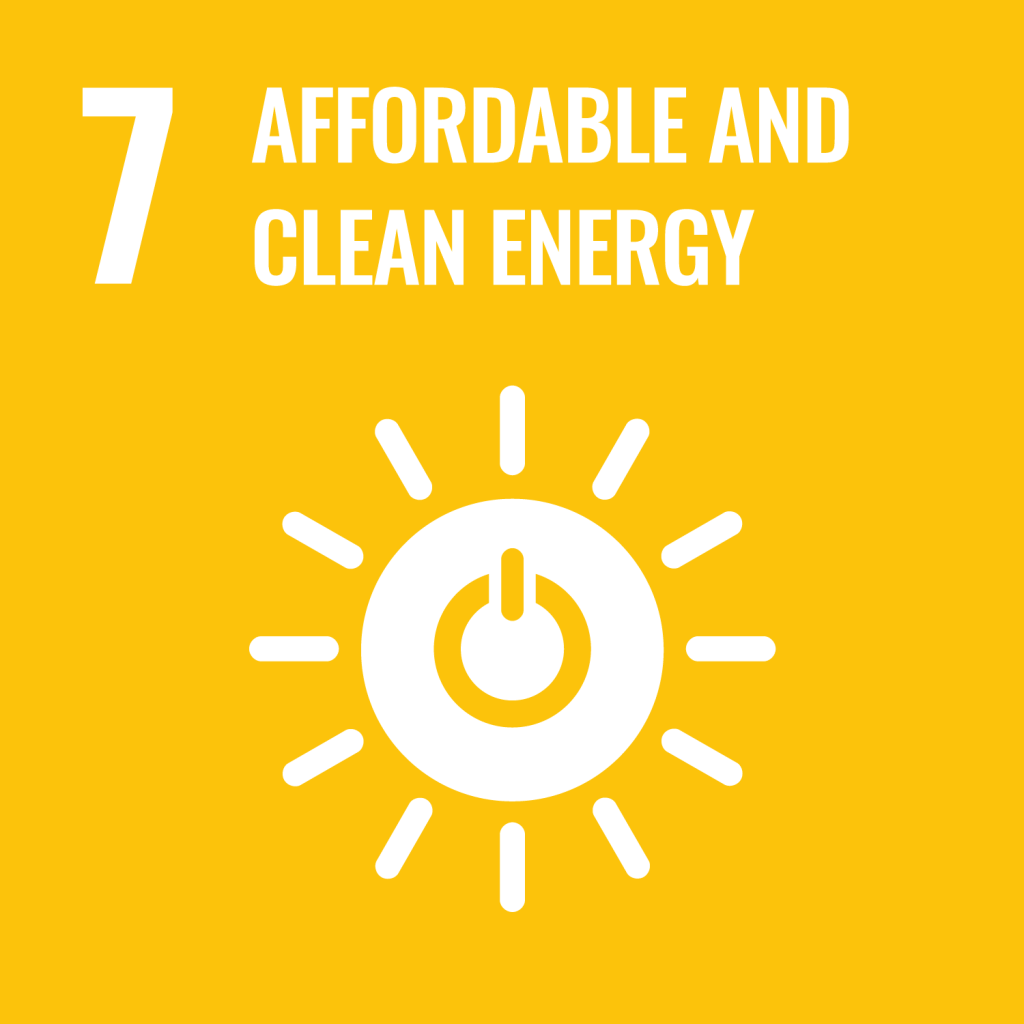
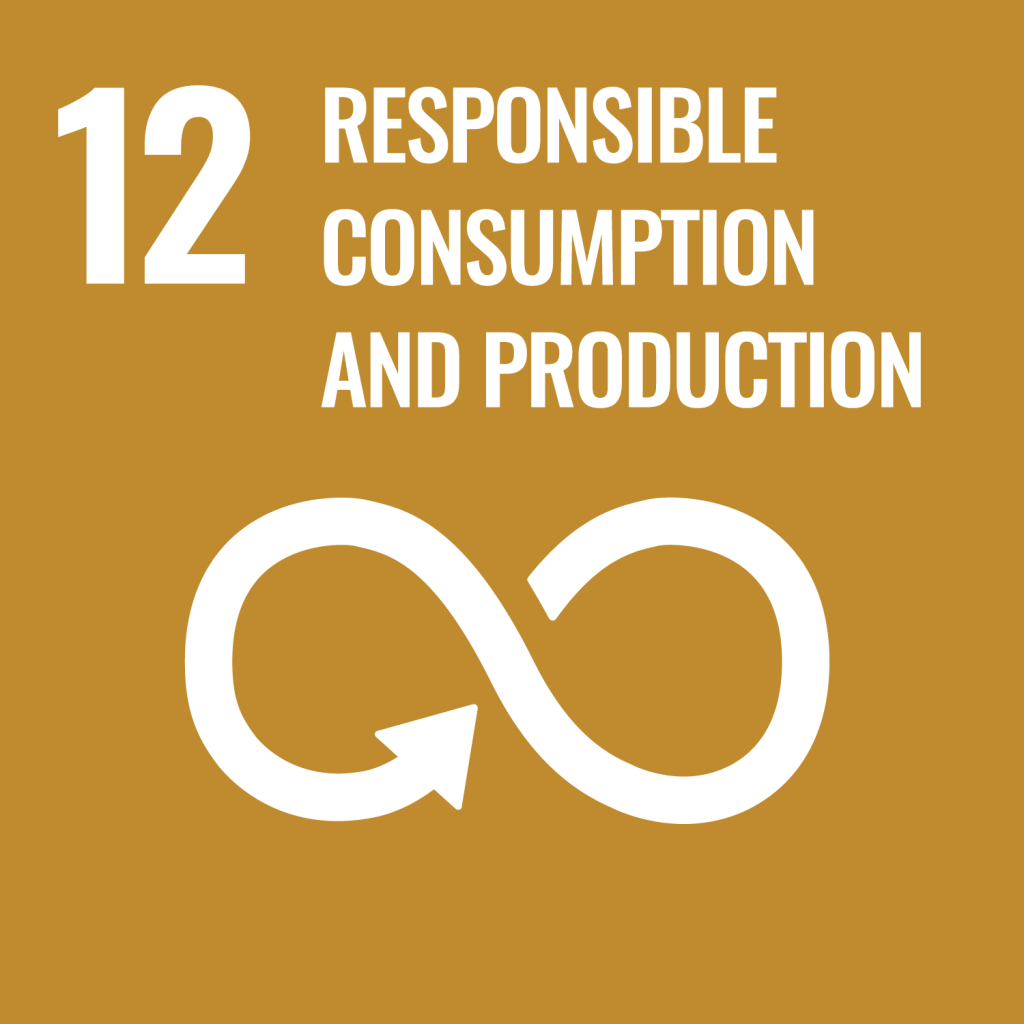
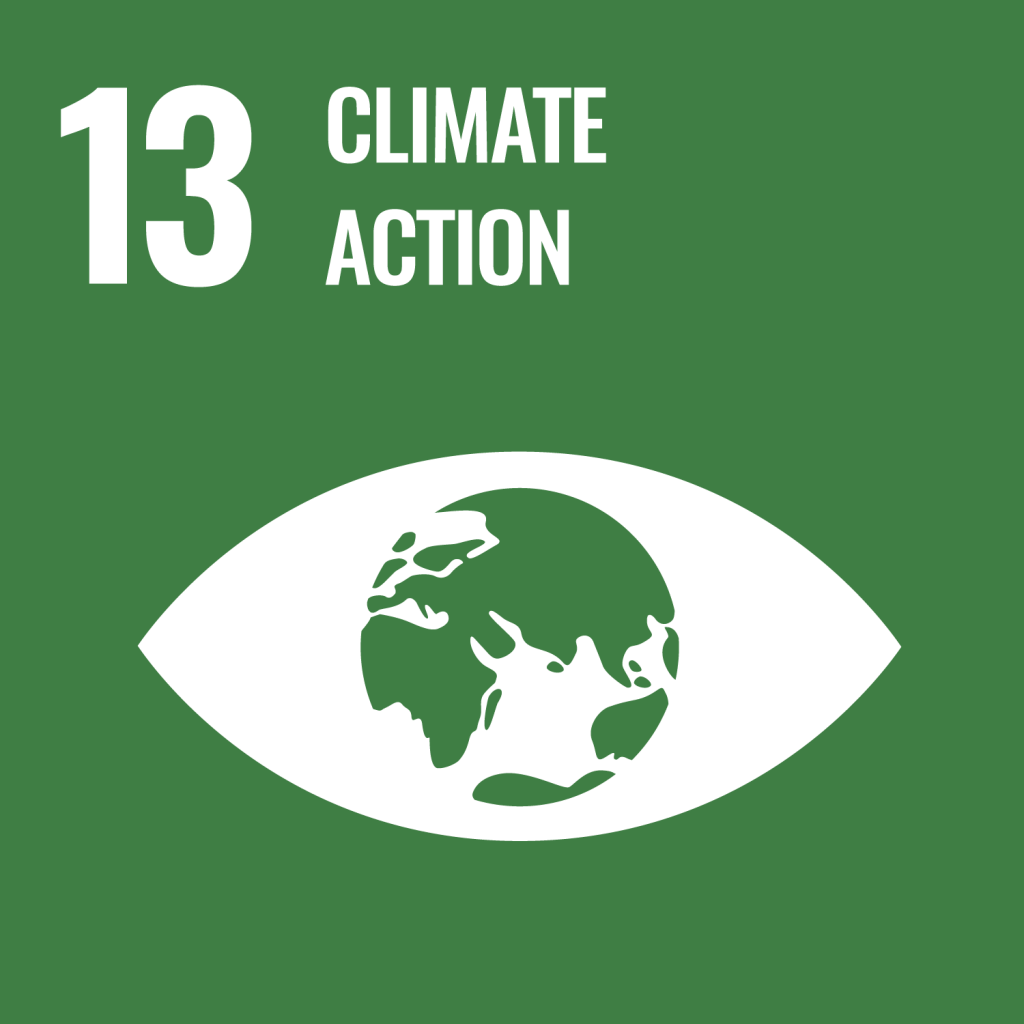
- Basic approach
- Structure(Governance)
- Strategy for realizing a decarbonized society
- Indicators, Targets, and Results
- Initiatives related to our manufacturing business
- Initiatives related to the entire value chain
- Strengthening climate change measures
- Collaboration with Stakeholders
Basic approach
The Glasgow Climate Pact was adopted at the 26th Conference of the Parties to the United Nations Framework Convention on Climate Change (COP26) in 2021, with the aim of addressing the global issue of climate change. The Pact incorporates a commitment to strive to keep the rise in average global temperatures within 1.5°C, which would have a less severe impact than the earlier target of 2°C, by utilizing the latest scientific know-how, and it thus set a de facto goal for the world to work toward. The Pact confirmed that the next 10 years will be vitally important for realizing this, and that it is important to reduce overall global greenhouse gas emissions by 45% by 2030 compared to 2010, and to cut emissions to net zero by 2050.
Toyobo group recognizes climate change as a very significant social issue that will have a critical impact on our business. We support the “Paris Agreement*” and "Glasgow Climate Pact" and aim to achieve carbon neutrality by the fiscal year 2051, consistent with the global 1.5°C target.
We also believe that it is important to collaborate with our customers, business partners, industries, local communities, the national government, and society as a whole in order to resolve climate change issues. Our group engages in discussions and dialogue with various stakeholders and works collaboratively to realize the net zero emissions and the goals of the Paris Agreements.
In addition, in January 2020, we expressed our support for the recommendations of the Task Force on Climate-related Financial Disclosures (TCFD) and have been promoting initiatives and information disclosure in line with these recommendations.
- The Paris Agreement is a global framework adopted in COP21 in 2015 to reduce greenhouse gas emissions after 2020. For the first time in history, it is a fair agreement involving all countries and including the goal of keeping temperature rise below 2 degrees Celsius, and preferably 1.5 degrees Celsius.
Structure(Governance)
President & Representative Director, CEO & Co-COO has the highest responsibility for climate change-related issues. The Board of Directors receives regular reports on climate change policies and significant matters discussed by the Sustainability Committee and provides supervision and guidance. The Sustainability Committee, chaired by the President & Representative Director, CEO & Co-COO, handles company-wide issues and risks, including climate change issues.
In fiscal 2024, the Sustainability Committee met six times, and the results of the meetings were reported to the Board of Directors. As a result, the Board of Directors adopted the following resolutions to accelerate efforts to reduce greenhouse gas (GHG) emissions.
- Revised the committee structure under the Sustainability Committee, establishing a new “Climate Change and Biodiversity Committee”
- Officially joined the “GX League” established by the Ministry of Economy, Trade and Industry and approved and announced voluntary targets aimed at the voluntary emissions transaction scheme under GX League (GX-ETS)
In addition, we have commenced consideration of officer compensation (incentives) linked with the reduction status of GHG emissions to boost the effectiveness of those reduction efforts, with the aim of introducing such compensation starting in FY2026.
Risk Management
In fiscal 2022, our group established a Risk Management Committee, which conducts uniform group-wide management of risks including climate change issues. In addition to its overall administration of risk management activities (identification, analysis, assessment, and response), the committee formulates policy related to risk management for the whole group, builds and operates effective, sustainable organizations and systems by running the PDCA cycle, and works to strengthen the risk management system. As our point of departure for risk management activities, we identify serious company-wide risks requiring intensive attention from the results of evaluations in terms of the two axes of severity of impact*1 and likelihood of occurrence*2 based on each risk scenario. Toyobo group manages its important risks based on a companywide assessment of risks that include natural disasters such as flooding (floods, storm surges, etc.), which are increasing in severity due to climate change.
- 1 Scope of impact, duration of business operation stoppage, personal damage, reputation, and financials are evaluated on a three-point scale that includes “major damage equivalent,” “moderate damage equivalent,” and “minor damage equivalent.”
- 2 Evaluations use a three-point scale including “occurs frequently,” “occurs occasionally,” and “occurs infrequently.”
Strategy for realizing a decarbonized society
Our group aims to achieve a “decarbonized society & circular economy” within the framework of the Sustainable Vision 2030. The total GHG emissions across our group's supply chain are approximately 6.33 million tonnes-CO2, which can be categorized into two sources: “business activity areas (Scope 1 and 2)” and “the entire value chain (Scope 3).”
Proportion of Scope 1, 2, and 3
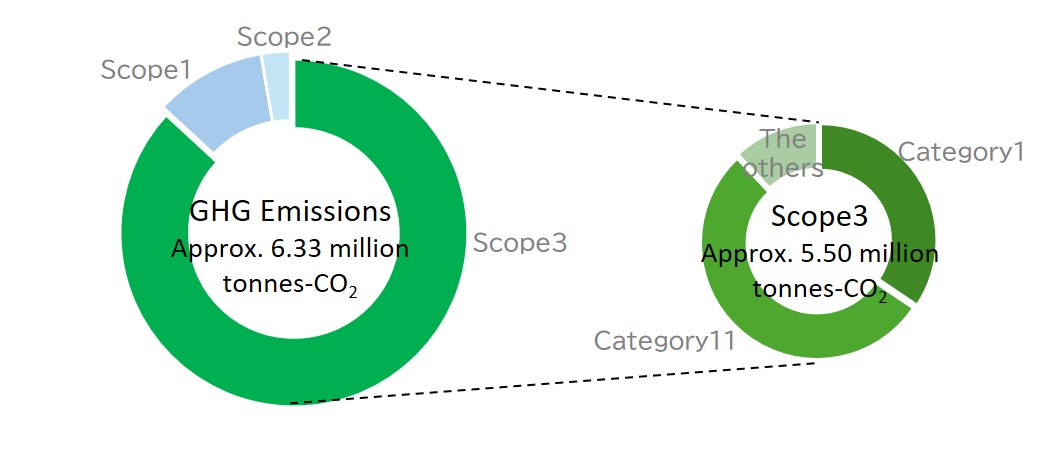
- Scope 1: Direct emissions from sources owned or controlled by the company
- Scope 2: Indirect emissions from the consumption of purchased electricity, heat, or steam
- Scope 3: Indirect emissions not included in Scope 1 and Scope 2. These are divided into 15 categories, including the emissions from activities related to purchased products and services such as manufacturing (Category-1) and from the use of products sold (Category 11).
Business activity areas
Approximately 20% of our group's total GHG emissions come from business activities (Scope 1 and 2). These emissions are primarily from fuel combustion at our on-site power generation facilities located at three sites in Japan (Tsuruga Research and Production Center, Iwakuni Production Center, and Inuyama Plant). It is therefore a crucial GHG reduction measure for our group to transition to low-carbon and decarbonization of its on-site power generation facilities. In fiscal 2023, we formulated and announced the “Scope 1 and 2 Reduction Plan (Roadmap to Carbon Neutrality)” as part of our transition plan to carbon neutrality, and we are promoting various measures. For more details on other initiatives, please refer to “Initiatives related to our manufacturing business.”
GHG emission rate by site
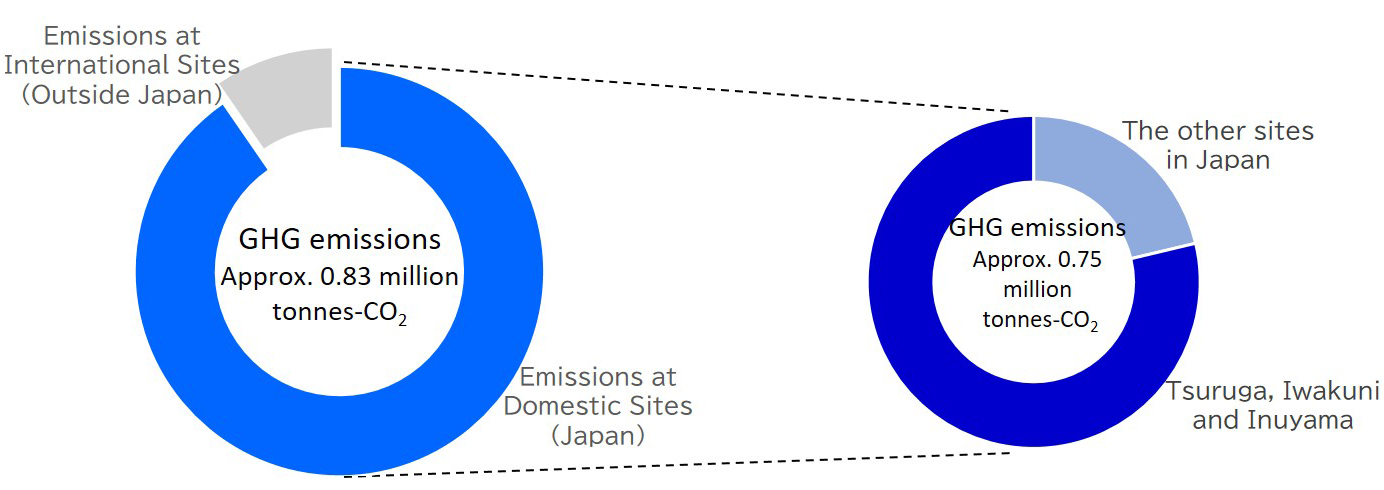
Estimating the financial impact of carbon pricing on our company
In the BAU* scenario, with fiscal 2021 as the base year, Scope 1 and 2 emissions would increase to about 1.3 million tonnes-CO2 in fiscal 2031 as our sales are expected to expand. If it is assumed that the carbon price in fiscal 2031 will be ¥15,000/tonne-CO2, the annual cost will be about ¥20.0 billion.
On the other hand, in the transition plan, we aim to reduce our Scope 1 and 2 emissions in fiscal 2031 to 0.655 million tonnes-CO2 or less by implementing measures such as “energy reductions and greater energy saving (including improvement of production efficiency),” “fuel conversion,” and “optimization of energy sources including the introduction of renewable energy.” In this case, the annual cost of the carbon price will be approximately ¥10.0 billion, resulting in a cost reduction of about ¥10.0 billion compared to the BAU scenario.
The cumulative capital expenditure (CAPEX) from 2022 to 2025 in accordance with this transition plan is included in the amount of investment in safety, disaster prevention, and environmental investment (approximately ¥18.0 billion)*.
- 1:BAU stands for Business As Usual. In this case, it refers to a scenario in which no particular measures are taken to reduce GHG emissions.
- 2: For details, please refer to the “2025 Medium-Term Management Plan (fiscal 2022–2025) - Review of the First Half and Actions for the Second Half”.
| Scope1 and 2 | Cost Corresponding to Scope 1 and 2 Emissions (Carbon Price: ¥15,000/tonne-CO2) |
|
|---|---|---|
| BAU scenario | Approx. 1.3 million tonnes-CO2 | Approx. 20.0 billion Yen |
| Transition plan | Approx. 0.655 million tonnes-CO2 | Approx. 10.0 billion Yen |
Entire value chain
Approximately 80% of our group's total GHG emissions come from indirect emissions associated with business activities (Scope 3). Within Scope 3, “procurement of materials and raw materials (Category 1)” and “use of sold products (Category 11)” account for about 90% of these emissions. Accordingly, we are focusing on procuring low-carbon and decarbonized materials and raw materials, as well as improving the energy efficiency of sold products as key measures. For more details, please refer to “Initiatives related to the entire value chain.”
Indicators, Targets, and Results
Medium- to Long-Term Targets
With regard to Scope 1 and 2 greenhouse gas (GHG) emissions associated with our business activities, we have set ourselves the target of realizing net zero emissions by fiscal 2051. The midterm target for fiscal year 2030 is to reduce GHG emissions by more than 46% compared to fiscal year 2014.
To contribute toward realizing the decarbonized society, we are proceeding with efforts to reduce GHG emissions and energy use from the entire value chain deriving from activities that are related to our own business, while also working to expand the contribution that we make toward reducing GHG emissions through our products and services.
Short-Term Targets
As short-term targets, our group has set reduction rates for GHG emissions intensity relative to sales in Scope 1 and Scope 2. The targets are utilized as evaluation indicators in sustainable finance.
Results of Scope 1 and 2
The actual results for Scope 1 and Scope 2 in fiscal year 2024 were 831 thousand tonnes of CO2, representing a 31.6% reduction compared to fiscal year 2013. In October 2023, we renovated the private power plant at the Iwakuni site, significantly reducing Scope 1 emissions by switching from coal to LNG and other fuels.
| Indicators | Targets | Progress (FY2024 Results) | Our Evaluation | ||||
|---|---|---|---|---|---|---|---|
| Base year | Target year | Targeted percentage change from base year (%) | Results | Reduction Rate | |||
| Mid-Term target | GHG Emissions Scope 1 and 2 (Consolidated) | FY2014 (FY2021) |
FY2031 | 46% or more reduction(27.0% or more reduction) | 831 thousand tonnes of CO2 | 31.6% | On Track |
| Short-Term Targets | Reduction Rate of GHG Emissions Intensity Relative to Sales | FY2021 | FY2027 | Reduction of 28.5% | 2.01 tonnes of CO2 per million yen | 25.0% | On Track |
| FY2021 | FY2028 | Reduction of 35.0% | |||||
- Calculation Scope: Total of Toyobo Co., Ltd. and Consolidated Subsidiaries
Results of Scope 3
The actual results for fiscal year 2024 showed a total of 5.499 million tons of CO2 for Scope 3, representing an approximate 4% increase compared to the previous year. The main reason for the increase in Category 11 was the expansion of operations at lithium-ion battery separator factories in response to growing global demand for EVs.
This led to strong sales of VOC recovery equipment used in those factories, which in turn increased emissions during the use of this apparatus.
Emissions by Category for Scope 3
| Category | GHG emission Thousand tonnes-CO2 |
|---|---|
| 1. Purchased goods and services | 1,894 |
| 2. Capital goods | 126 |
| 3. Fuel- and energy-related activities (not included in Scope 1 or Scope 2) | 108 |
| 4. Upstream transportation and distribution | 50 |
| 5. Waste generated in operations | 45 |
| 6. Business travel | 9 |
| 7. Employee commuting | 5 |
| 8. Upstream leased assets | Not applicable to the company |
| 9. Downstream transportation and distribution | GHG emissions of transportation to the shipping destination includes in the category 4. |
| 10. Processing of sold products | ― |
| 11. Use of sold products | 2,944 |
| 12. End-of-life treatment of sold products | 318 |
| 13. Downstream leased assets | Not applicable to the company |
| 14. Franchises | Not applicable to the company |
| 15. Investments | Very low emissions |
| Total | 5,499 |
Acquisition of SBT Certification
In December 2022, our group's GHG emissions reduction targets were recognized as science-based targets, or SBT*, by the global initiative SBTi.
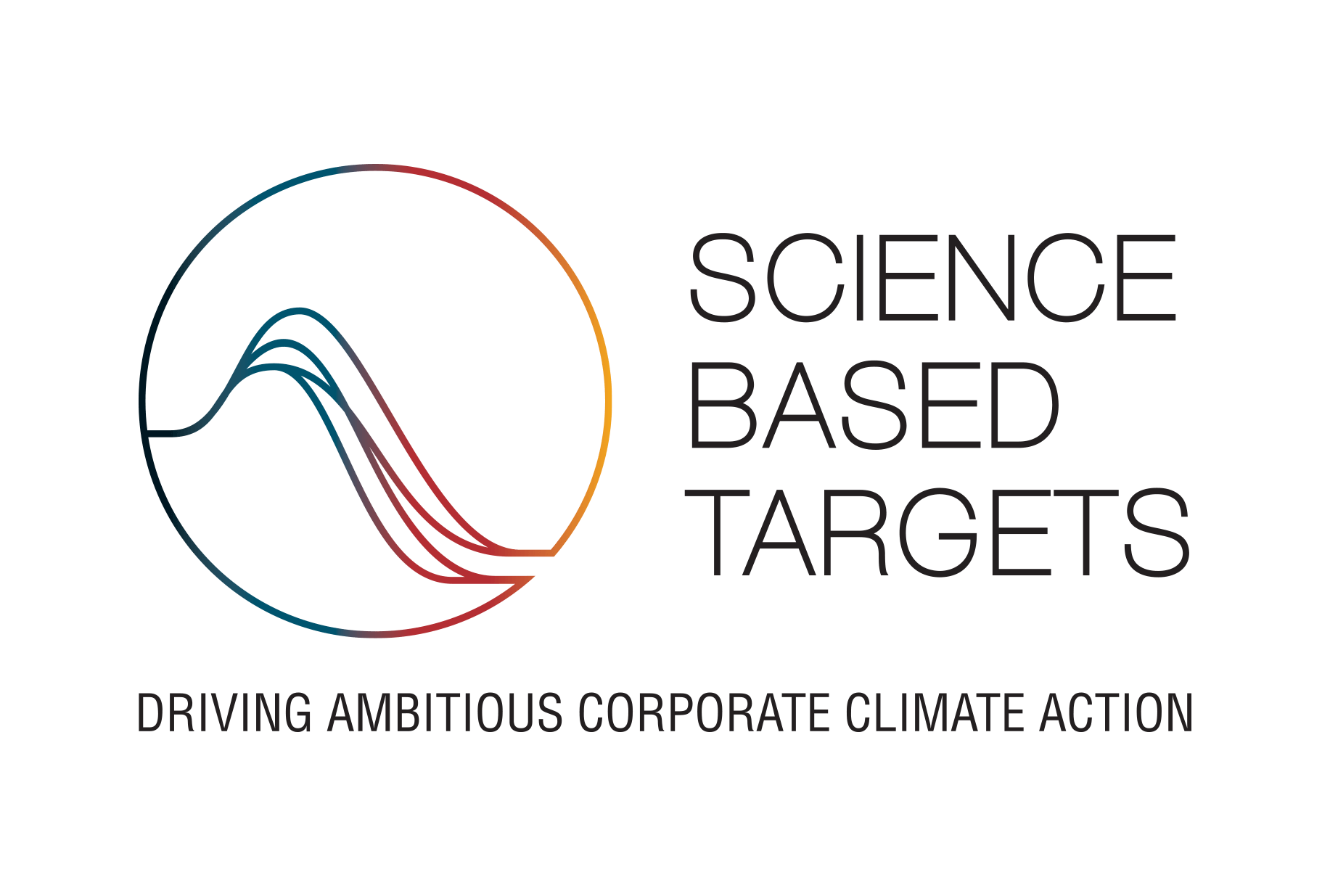
The targets approved by SBTi are as follows.
| Category | Target | Progress (FY2024 Results) | Our Evaluation |
|---|---|---|---|
| Scope1、2 | 27.0% reduction in GHG emissions by FY2031 over FY2021 | 9% reduction from FY2021 level | On Track |
| Scope3 (Category 1+11) |
12.5% reduction in GHG emissions by FY2031 over FY2021 | 109% increase from FY2021 level | In Progress |
The target for Scope 1 and 2 corresponds to a reduction of GHG emissions by at least 46% by fiscal 2031 compared with fiscal 2014.
- *
- A target to reduce greenhouse gas emissions in line with what is considered to be a state-of-the-art climate-science requirement to meet the Paris Agreement targets
Independent Verification by third party
To increase reliability of our information, we have obtained independent verification from KPMG AZSA Sustainability Co., Ltd., that covers our Scope1,2, a portion of Scope3, and data on energy-consumption for fiscal 2023.
Scope of Assurance: Scope 1, 2, and Scope 3 (Categories 3 and 11), Energy Amount
Initiatives related to our manufacturing business
Reduction of Scope 1 and 2 emissions
Formulating transition plan towards achieving a decarbonized society and economy
As a transition plan towards achieving a decarbonized society and economy, we have formulated a reduction plan for Scope 1 and Scope 2 (a roadmap to carbon neutrality). With business expansion expected to increase production activities by fiscal year 2031, it is anticipated that GHG emissions would also increase if no action is taken. To counter this, we will promote energy reduction (including energy conservation and improvement of production efficiency), fuel conversion (de-coal), and optimization of electricity use, including renewable energy, to curb energy consumption and reduce GHG emissions (Scope 1 and Scope 2). The contributions of major GHG reduction measures are as follows:
| Key elements | Contribution |
|---|---|
| Fuel conversion | Approximately 40% |
| The others ・Energy reduction (including energy conservation increased production efficiency) ・Introduction of renewable energy |
Approximately 60% |
- An acronym for “Business as Usual,” indicating a case in which no particular GHG emission reduction measures are taken.
Roadmap for Carbon Neutrality
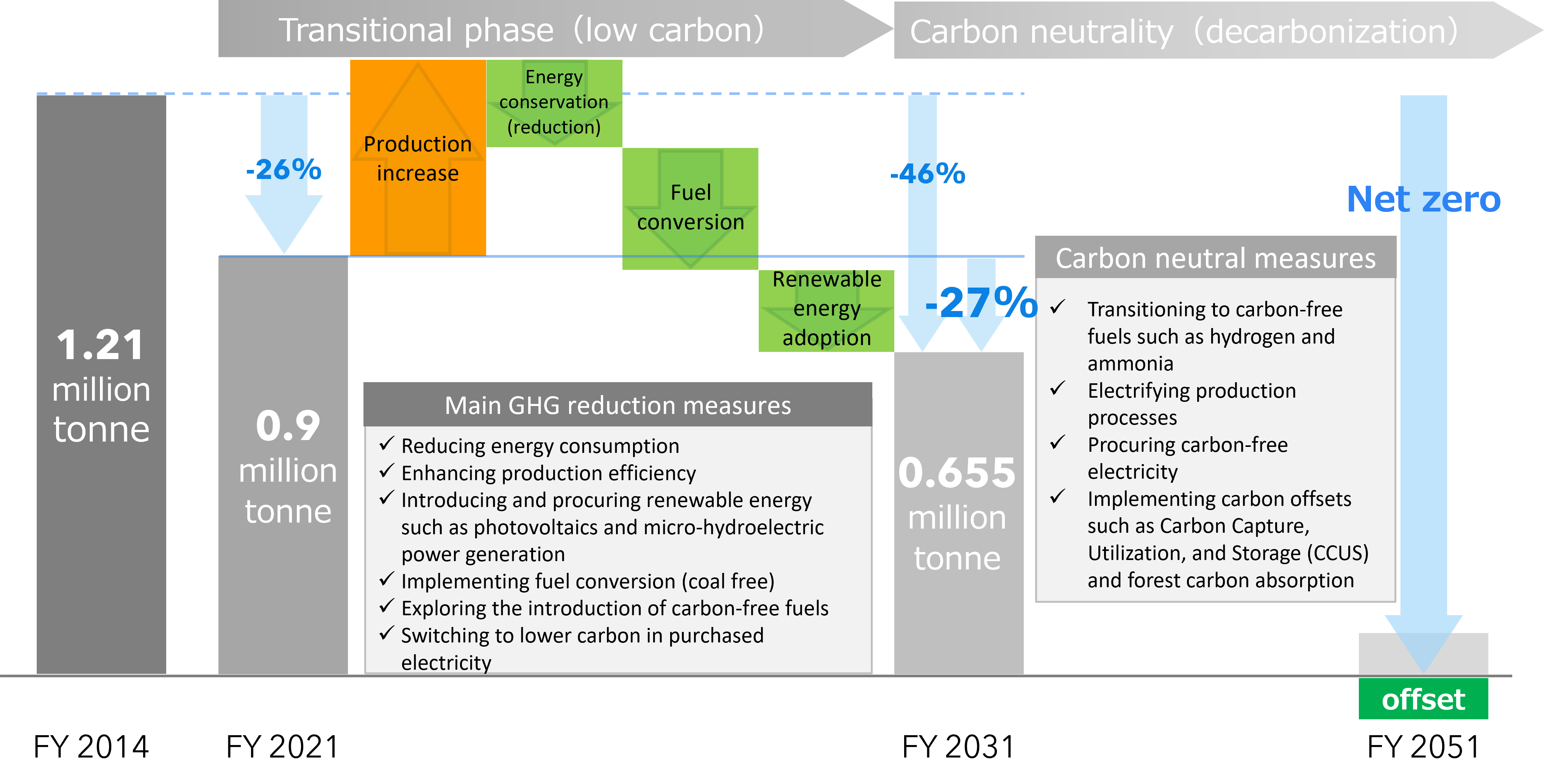
Energy reduction and conservation
TOYOBO CO., LTD. has set a shared goal of improving energy-efficiency* by 1.0% or more annually. In fiscal 2024, we achieved this target through various energy-saving efforts. Specifically, we improved the power generation efficiency of our in-house power generation facilities, added waste heat recovery systems to production lines, and introduced energy-saving equipment. The three sites with particularly high GHG emissions (Tsuruga, Iwakuni, and Inuyama) have set even higher targets than the shared goal and are actively working to reduce their energy use.
In addition, we hold monthly meetings of the Energy Use Efficiency Committee, which consists of members from our main business sites and plants. The committee monitors the energy conservation activities of each site and shares know-how on energy conservation. Each committee member also conducts simple audits ("energy-saving patrols") at each factory site as appropriate to maintain and improve the level of activity.
- Energy consumption per sales and production volume in accordance with Japan's act on rationalizing energy use
The highest rank in“Business Operator Classification Evaluation System”
The “Business Operator Classification Evaluation System,” led by the Ministry of Economy in Japan classifies all business operators that submit regular reports under the Act on the Rational Use of Energy (Energy Conservation Act) into four categories: S (excellent business operators), A (business operators expected to make further efforts), B (stagnant business operators), and C (business operators requiring attention).
Our group has achieved energy-saving targets through the introduction of energy-saving equipment and received S-class evaluations as follows:
- TOYOBO CO., LTD
- : For five years in a row since fiscal 2020
- TOYOSHINA FILM CO., LTD.
- : For five years in a row since fiscal 2020
- TOYO CLOTH CO., LTD.
- : For six years in a row since fiscal 2019
- YUHO Co., Ltd.
- : fiscal 2024
- Miyuki Keori Co.,Ltd.
- : fiscal 2024
Fuel conversion (away from coal)
We are also implementing a transition toward low-carbon energy use, by switching to fuels with lower carbon contents for our in-house electricity generating equipment and installing additional gas co-generation system*1 equipment.
Fiscal 2024 achievements
Iwakuni Production Center: Renewed the in-house thermal power generation plant, converting the fuel from coal to liquefied natural gas and RPF*2.
Inuyama Plant: Installed an additional gas cogeneration system to improve energy efficiency of the entire plant.
We are carrying out GHG reduction measures including fuel conversion at other business sites as well.
Future investments in power and utility facilities, including in-house power generation and renewable energy, will be carried out using the Internal Carbon Pricing (ICP) system, in line with the "Roadmap to Carbon Neutrality."
- 1: Gas co-generation systems are systems that use natural gas to generate electricity, with the waste heat being harnessed to produce steam and hot water that are used in manufacturing processes, for supplying hot water, for air conditioning, etc.
- 2: An acronym for “Refuse-derived Paper & Plastics Densified Fuel,” solid fuel made mainly from used paper and waste plastic
Introduction of renewable energy
We are proceeding with the installation of photovoltaic power generation at each of our business sites, making use of roof spaces and unused land.
TSSW (Thailand) Initiatives
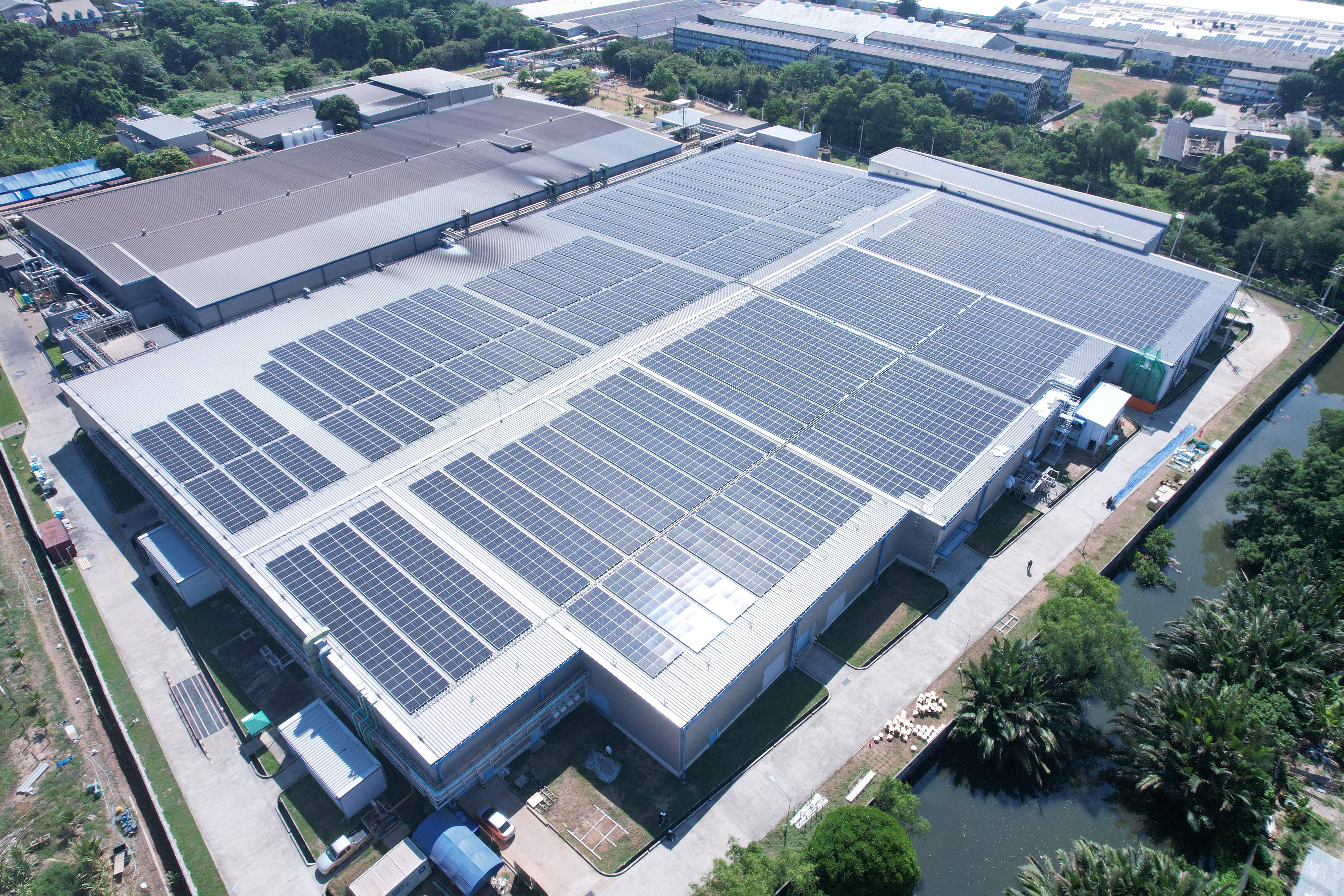
Solar panels installed on the roof of TSSW with a power generation capacity of approximately 2,300 kW.
Toyobo Saha Safety Weave Co., Ltd. (TSSW) is located in Thailand and manufactures base fabrics for airbags. TSSW plans to operate solar power generation equipment utilizing a Power Purchase Agreement (PPA*) within fiscal 2025, which will replace approximately 15% of the energy used at the plant with renewable energy. This will enable the reduction of GHG emissions, stabilization of energy sources, and supply of low-carbon products to customers.
- PPA (Power Purchase Agreement): A system where a business operator rents the roof or idle land of a facility owned by a company, installs power generation equipment free of charge, and the company uses the generated electricity at the facility. This has the advantage of reducing electricity costs and CO2 emissions.
Voice of the Person in Charge
In recent years, "environmental responsiveness" has become a value in the automotive industry ,and we recognize that this may influence our customers' selection of suppliers. At our plant, we decided to install solar power generation equipment because it contributes to increasing the use of renewable energy and leads to cost reduction. In Thailand, introduction of solar power generation equipment is increasing. Although it took a long time to obtain a construction permit under this influence, the installation was successfully completed. We will continue to promote environmental initiatives suitable for our plant.
Inuyama Plant Initiatives
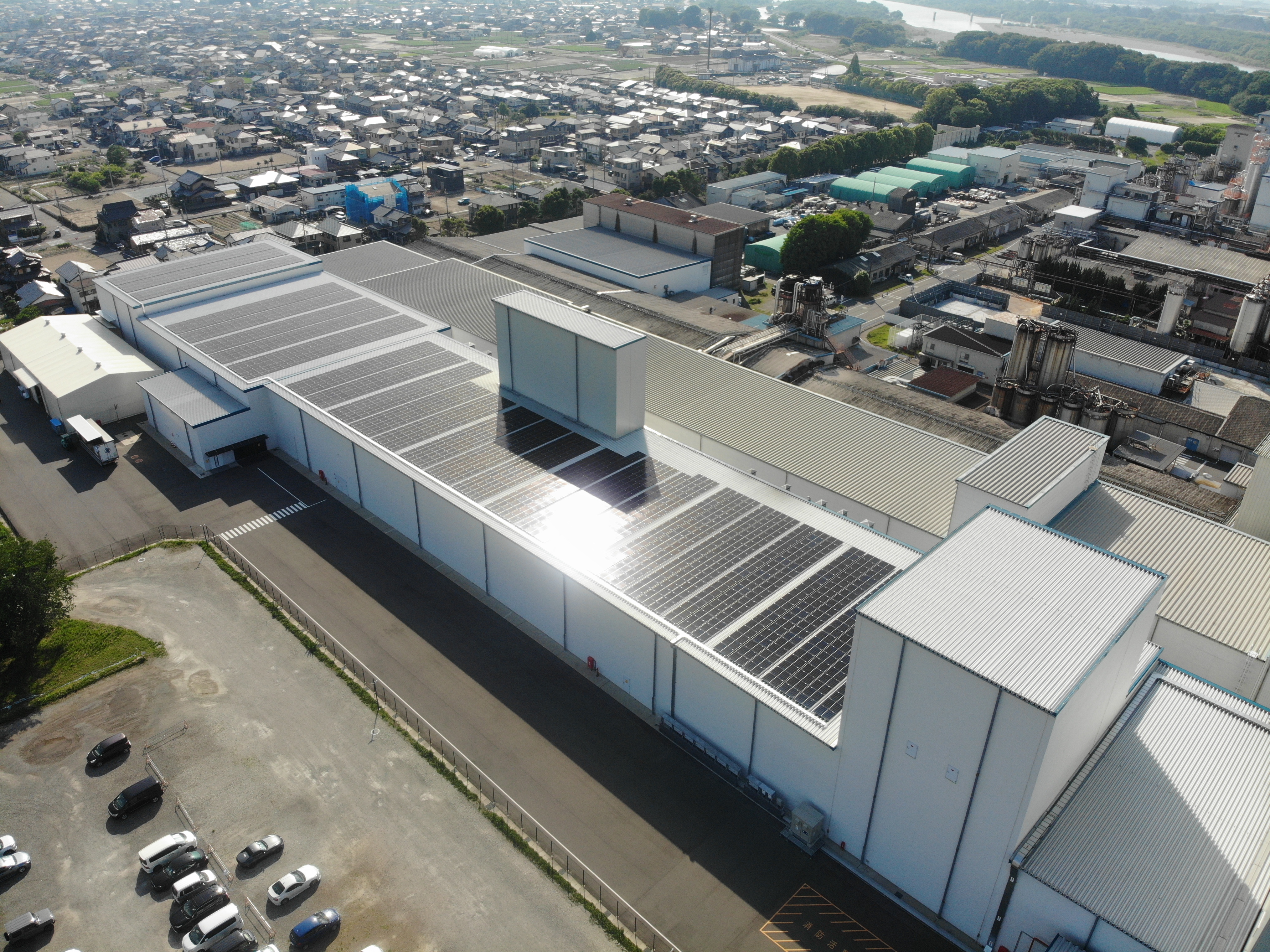
1,608 solar panels (power output approximately 500kW)
installed on the rooftop of Inuyama Plant
Inuyama Plant has proclaimed the slogan “Aiming for a Sustainable Plant” and is striving to improve energy efficiency, adopt energy-conserving facilities, and put renewable energy to use. In FY2023, the plant used a power purchase agreement (PPA*) arrangement to install a new solar power generation facility of approximately 500 kW. The factory also working to raise awareness of our employee by installing monitors in our offices that allow us to check power use and generation in real time. In the future, the plant is planning to implement other GHG reduction measures such as fuel conversion, and will continue to consider and introduce various initiatives to realizing to be a sustainable plant.
Voice of the person in charge
This was the first time our company had tried a PPA, so we got the cooperation of a range of people, and the manufacturer of the solar power generation facilities, our company headquarters and the manufacturing division within the plant all worked together. It was a particular struggle connecting these facilities while giving consideration to the effect it would have on our existing electrical system. When it started generating electricity without a hitch, our hard work was paying off even more as it leads to reduced electric charges which continue to soar.
Initiatives related to the entire value chain
Reduction of Scope 3 emissions
Our group aims to reduce Scope 3 emissions, focusing particularly on reducing emissions in Category 1*1 (approximately 30% of the total) and Category 11*2 (approximately 50% of the total), which have the largest emissions.
Initiatives for Category 11
The majority (over 90%) of Category 11 emissions are due to the VOC recovery apparatus*3 sold by our group, which generates GHG emissions from the utilities such as steam, electricity, cooling water, etc. required for its operation. Recently, the adoption of our VOC recovery apparatus in the manufacturing process of separators for EV lithium batteries has been expanding, and the sales volume of this apparatus is also increasing, leading to a rising trend in Category 11 emissions.
On the other hand, we are promoting the introduction of new technologies and energy-saving technologies into this apparatus, aiming to reduce GHG emissions by curbing and reusing utility consumption and improving energy efficiency.
Our group's VOC recovery apparatus contributes to reducing environmental impact, including GHG emissions, by efficiently removing volatile organic compounds (VOCs) generated at our customers' factories related to EVs, semiconductors, pharmaceuticals, printing, and others. The apparatus enables the recovery and reuse of organic solvents. For more details, please refer to the Eco-Conscious Products page.
Scope 3 Breakdown
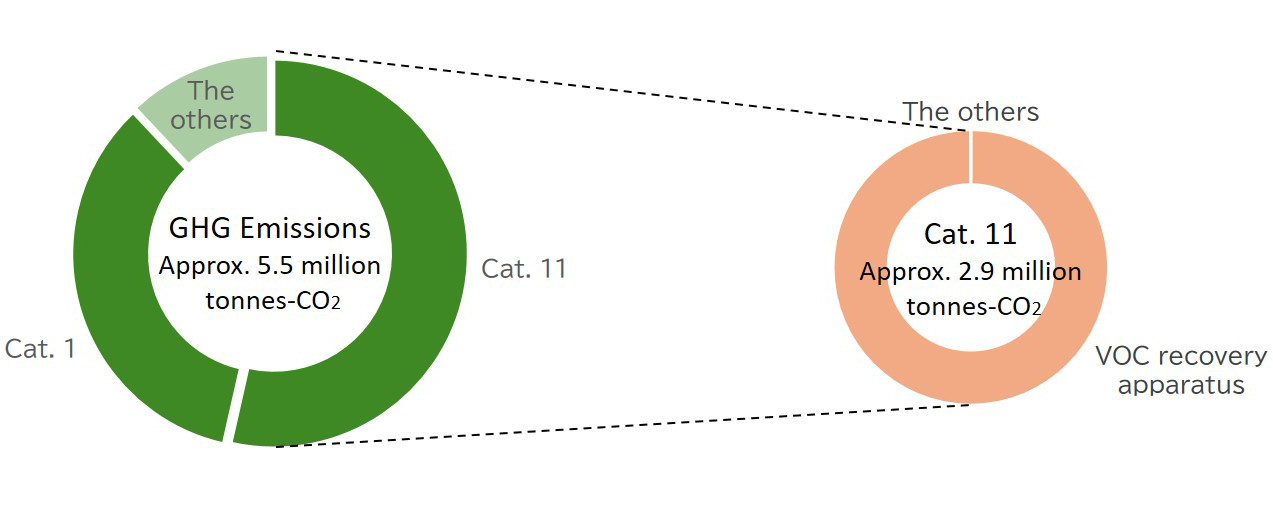
- 1: Emissions from activities (such as manufacturing) relating to purchased goods and services
- 2: Emissions from use of sold products
- 3: apparatus that removes VOC, Volatile Organic Compounds, by an adsorptive method, an absorptive method, or a chilling method, and recovers VOC as a liquid organic solvent. CO2 emission from VOC decomposition is zero. Moreover, the recovered organic solvent can be reused. VOC is a generic term for volatile organic compounds such as toluene, ethyl acetate, and dichloromethane. It causes atmospheric pollution / air pollution and is responsible for asthmatic and other health-related problems.
Energy-saving initiatives in logistics
Our annual goal is a 0.5% year-on-year reduction in CO2 emissions per unit of transportation in relation to logistics.
In the Logistics Department, we launched the Green Logistics Promotion Project in 2006, and as well as working to improve quality and cost rationality, we are also continuously working on environmental conservation such as energy saving, resource saving, and prevention of global warming. Up until now, we have implemented a variety of measures in order to reduce the environmental impact of logistics. These measures include shortening transportation distances by using the nearest port to our production sites, and using efficient stacking and bulk transport of cargo in order to reduce the number of vehicles used. We are also actively promoting the usage of ship and rail transportation which have lower specific energy consumption than truck transportation, together with lower CO2 emissions.
We have been introducing a logistics system since 2019. Based on dispatch simulations, we worked to further improve loading efficiency by optimizing the allocation of vehicles.
As a result of these efforts, we were able to reduce CO2 emissions per unit of transportation by approximately 0.4% in fiscal 2024 compared to the previous year.
Strengthening climate change measures
Structure to achieve carbon neutrality
Starting from fiscal 2024, we have established a new "Climate Change and Biodiversity Committee." Recognizing that "responding to climate change" and "conserving biodiversity" are among the most critical business issues, we will promote activities to minimize our group's risks and seize business growth opportunities through the business operations of the Toyobo Group and its supply chain.
Additionally, we will promote companywide climate change responses with a view to internationally applicable sustainability standards.
Achievements of the Climate Change and Biodiversity Committee
- Implementation of GHG reduction measures in line with the Carbon Neutral Roadmap
- Obtaining third-party assurance for GHG emissions
- Participation in and goal setting for the emissions trading system (GX-ETS) in Japan
Introduction of internal carbon pricing system
In April 2022, we introduced an "Internal Carbon Pricing System," setting an internal carbon price to guide investment decisions. To achieve our group's "Roadmap to Carbon Neutrality" in line with the Paris Agreement and Japan's NDC, we use this system as one of the criteria for investment decisions. This promotes investments that contribute to GHG emissions reductions, including investment in low-carbon and decarbonization apparatus and development facilities.
Outline of Toyobo's ICP system
| Internal carbon pricing fee (tax) | 10,000 yen per tonne-CO2 |
|---|---|
| Targets of investment | Capital investment in facilities with fluctuating CO2 emissions |
| How to use it | Based on the internal carbon pricing fee, calculating CO2 fluctuation by the proposed facilities (including facilities for research and development) as costs. The calculations will be made in accordance with capital investment plans. |
Development of technologies that contribute to the realization of a decarbonized society
Bio-Manufacturing: Initiatives to develop revolutionary production systems begin

Mannosylerythritol Lipid, a surfactant produced by microorganisms
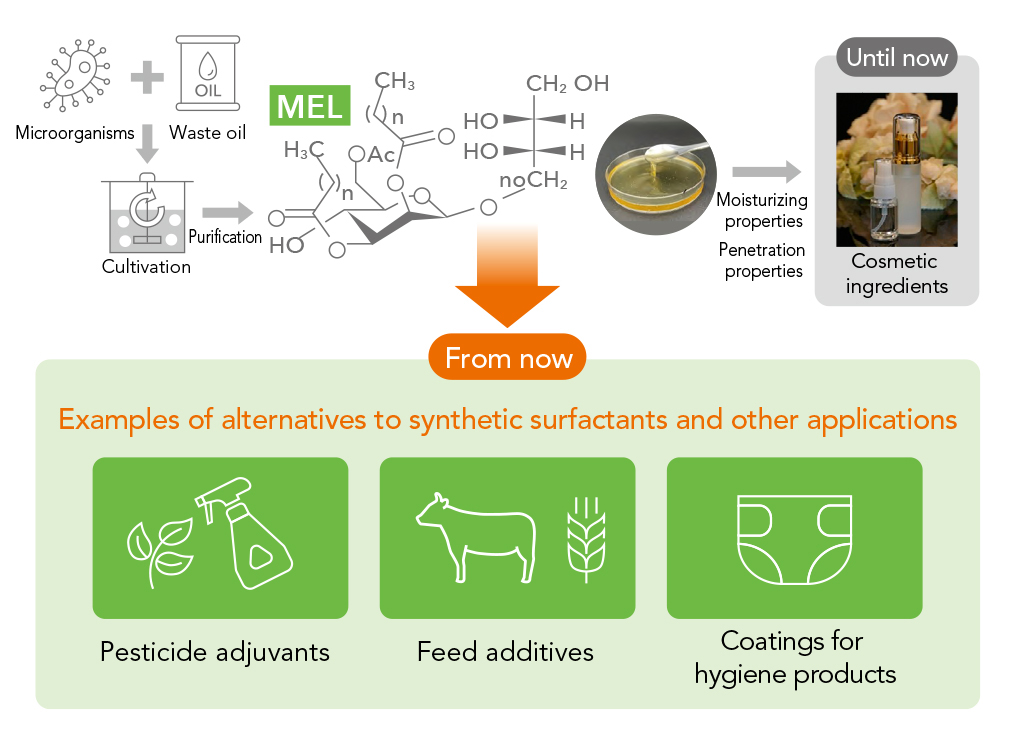
"Bio-Manufacturing" is a new technology that utilizes genetic engineering to produce useful target substances from cells of microorganisms, plants, and animals. Unlike traditional chemical manufacturing processes that use fossil resources as raw materials, this technology does not require multi-step chemical reactions and can be produced under natural conditions such as normal temperature and pressure. These features contribute to reducing GHG emissions and the use of fossil resource raw materials, and been increasingly anticipated in recent years.
Our company, in collaboration with the National Institute of Advanced Industrial Science and Technology (AIST), has been selected for the "Bio-Manufacturing Revolution Promotion Project" by the New Energy and Industrial Technology Development Organization (NEDO). Together, we are advancing the research and development of a revolutionary production system aimed at expanding the application fields of "Mannosylerythritol Lipid (MEL)," a natural surfactant produced by microorganisms (yeast). For more details, please refer to the news release below.
Development of technologies that contribute to the realization of a decarbonized society
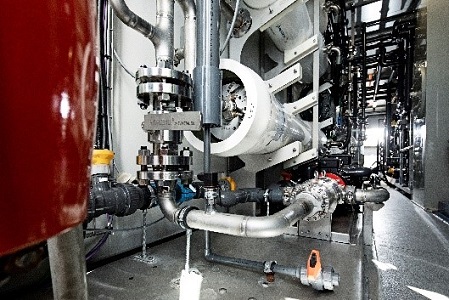
Osmotic power generation plant
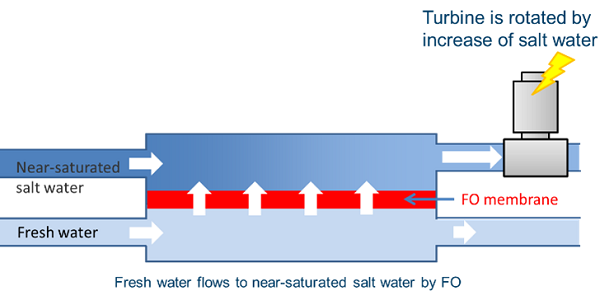
Mechanism of osmotic power generation
Osmotic power generation using high-salinity geothermal water, a source of renewable energy, has been receiving public attention. Toyobo has developed a forward osmosis (FO) membrane for the power plant core used in this method, and it has been used in osmotic power generation plants of Danish venture firm SaltPower.
In April 2023, it was installed at Nobians saltworks in Denmark and is now in operation.
Geothermal water osmosis power generation uses the high osmotic pressure of geothermal water with high salt concentrations pumped from underground. Compared with solar and wind power, the weather and time of day does not affect geothermal power generation. Furthermore, compared to coal-fired power generation, no harmful substances such as nitrogen oxides or sulfur oxides are emitted during combustion.
Find more information about the other technologies here.
Contribution to Offshore Wind Power Generation
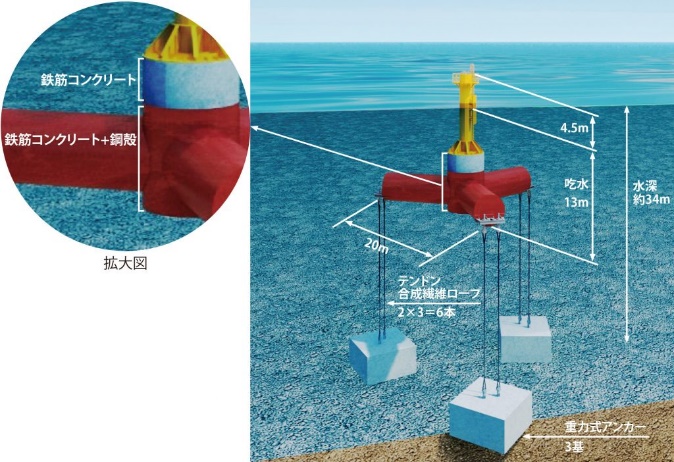
TLP-Type Floating Structure and Configuration Image (Image Courtesy: Obayashi Corporation)
Our group is participating in Japan's first TLP (Tension Leg Platform) type floating offshore wind power facility installation experiment conducted in real sea conditions by Obayashi Corporation. Together with Obayashi Corporation and Tokyo Seiko Rope Mfg. Co., Ltd., we are conducting joint research and development on mooring lines that connect the floating structure to the seabed. The mooring lines used in the experiment feature ropes made from our newly developed ultra-high-strength polyethylene fiber "IZANAS® ULC."
By advancing the development and production of high-performance materials for the social implementation of offshore wind power generation, we contribute to the spread of renewable energy and the realization of a carbon-neutral society.
Contribution to energy-efficient next-generation seawater desalination Systems
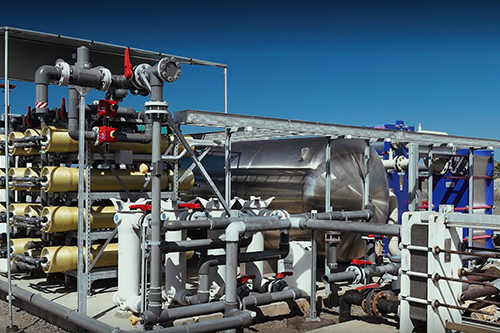
Trevi Systems' demonstration seawater desalination plant

Hollow fiber forward osmosis (FO) membrane
Through the development and performance improvement of high-efficiency FO membranes with low pressure loss, we are collaborating with Trevi Systems, Inc. in the United States to commercialize energy-efficient seawater desalination systems. The FO membrane method, which utilizes osmotic pressure difference as a driving force, can extract fresh water from seawater with less electricity compared to traditional evaporation or RO membrane methods.
Our group's FO membranes were also adopted in the seawater desalination demonstration experiment conducted by Trevi Systems in Hawaii, USA, from June 2022 to September 2023. The plant where the demonstration was conducted is an "energy-efficient seawater desalination system" that converts the energy of sunlight into heat using concentrated solar power technology, generating most of the energy required for the plant's operation.
Practical application of high-heat-resistant adhesive material 'Vitrimer' for ambient temperature distribution
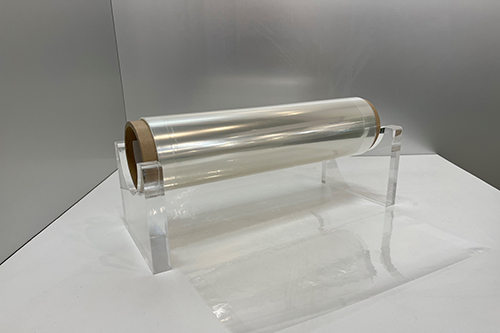
A roll of highly heat-resistant adhesive sheet
Toyobo Co., Ltd. and Toyobo MC Corporation have developed a high-heat-resistant polyester adhesive sheet for electronic materials by applying a new material called “Vitrimers*.” This adhesive sheet can be transported and stored at ambient temperatures, eliminating the need for long-term heat curing (typically around 150°C for about 4 hours). These features contributes to energy savings during the distribution of adhesive sheets, as well as the simplification and energy efficiency of thermal processing steps, thereby reducing GHG emissions across the entire value chain of the electronics industry. Additionally, since the sheet is solvent-free, it also helps reduce VOC (volatile organic compounds) emissions.
- “Vitrimer" is a registered trademark of FONDS ESPCI PARIS.
Power-generating material for organic photovoltaics
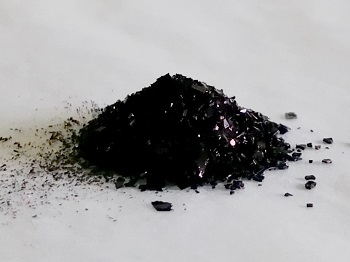
Power-generating material for OPV
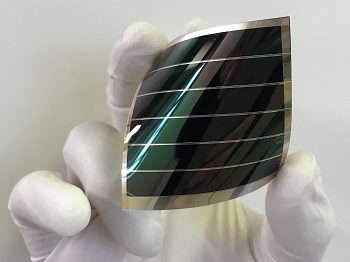
OPV module on PET film substrate
In pursuit of a decarbonized society, the market for next-generation solar cells utilizing renewable solar energy is expected to expand. Our group has been developing power-generating materials for organic photovoltaic (OPV) cells, which can achieve high output even under low-light indoor conditions, by applying organic synthesis technologies cultivated over many years in the fine chemicals business. In 2020, we completed the material design and successfully prototyped modules on lightweight and thin PET film substrates. OPV is expected to play a significant role in reducing the size and weight of sensors and as a communication power source and a weather-independent power source due to its power generation performance across a wide range of illuminance, flexibility, transparency, and environmental adaptability. In addition, compared to perovskite solar cells (PSC), another type of organic solar cell, OPV does not use lead, which is harmful to humans and the environment, making it a more environmentally friendly option.
Collaboration with Stakeholders
Toyobo group believes that it is important to collaborate with our customers, business partners, industries, local communities, the national government, and society as a whole in order to resolve climate change issues. Our group engages in discussions and dialogue with various stakeholders and works collaboratively to realize the net zero emissions and the goals of the Paris Agreements.
In addition, our group supports the climate change initiatives of industry associations and actively participates in their activities. In cases where there is a conflict or inconsistency between our group's policies and those of the industry associations we will take appropriate action to resolve these discrepancies.
Communication and Collaboration with business partners
Our group has established the "CSR Procurement Guidelines," which incorporate the TOYOBO Group Fundamental Policy on the Global Environment. We request our business partners to cooperate in efforts to support the development of a sustainable society throughout the entire supply chain. The "CSR Procurement Guidelines" ask our business partners to continue and strengthen their environmental activities, including initiatives to address climate change issues.
- To strive to reduce greenhouse gas (CO2 and other gases) emissions, and mitigate climate change
- To strive for effective use of resources and energy savings such as improving the efficiency of water and energy use
Since fiscal 2024, we have been distributing a video of the Toyobo Group CSR Procurement Briefing to approximately 500 major business partners worldwide as part of their training. In the briefing, we explained the Toyobo group's sustainability initiatives (such as carbon neutrality, respect for human rights, CSR procurement policies, and environmental policies) and requested compliance with the "Toyobo Group CSR Procurement Guidelines." We also expressed our desire to collaborate with our business partners to contribute to the development of a sustainable society throughout the entire supply chain. Based on the guidelines, our group's procurement department conducts a "CSR Procurement Survey" for business partners to monitor and evaluate their efforts to reduce GHG emissions and other risk factors. If the survey finds issues with business partners, we ask them to make improvements. Please see the following sections for the latest survey results and corrective actions.
Involvement in organizations dedicated specifically to climate-related issues
GX League
Our group participates in the "GX (Green Transformation) League," led by the Japanese government (Ministry of Economy, Trade and Industry). By engaging in activities such as voluntary emissions trading (GX-ETS), rule making for market creation, and the generation of business opportunities, we are accelerating our efforts towards achieving carbon neutrality. We aim to drive economic growth and transform social structures by collaborating with participating companies, government agencies, universities, financial institutions, and other stakeholders.
Green x Digital Consortium
We participate in the "Green x Digital Consortium", which aims to create a new society and market using digital technology to achieve carbon neutrality in society as a whole.
Keidanren Carbon Neutrality Action Plan
As a member of the Japan Chemical Industry Association (JCIA), our group participates in the "Carbon Neutrality Action Plan" of the Japan Business Federation (Keidanren). Through the initiative, we confirm the Japanese government's climate change policy and reflect it in our group-wide policy. We are working with the association on a variety of engagement activities related to climate change measures, including the submission of comments on government policies, and are working to realize a decarbonized society.
Keidanren “Challenge Zero” initiative
In support of the “Challenge Zero" managed by the Japan Business Federation (Keidanren) in cooperation with the Japanese government, we have announced specific initiatives for challenge innovation to create a decarbonized society.






